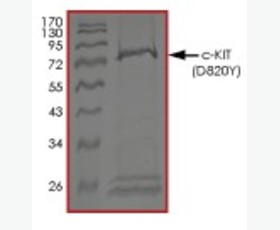Recombinant Human Connective Tissue Growth Factor/CTGF/CCN2
| Product name: | Recombinant Human Connective Tissue Growth Factor/CTGF/CCN2 |
| Source: | E.coli |
| Purity: | Greater than 95% as determined by reducing SDS-PAGE. |
| Buffer Formulation: | Lyophilized from a 0.2 μm filtered solution of PBS,pH 7.4. |
| Applications: | SDS-PAGE, Western Blot (WB), ELISA (EIA), Immunoprecipitation (IP) |
| Storage: | Avoid repeated freeze/thaw cycles. Store at 2-8 oC for one month. Aliquot and store at -80 oC for 12 months. |
| UOM: | 100ug/50ug/200ug/1mg/1g |
| Source | Human Cells |
| Description | Recombinant Human CTGF is produced by our Mammalian expression system and the target gene encoding Gln27-Ala349 is expressed with a Fc tag at the C-terminus. |
| Names | Connective tissue growth factor,CCN family member 2,Hypertrophic chondrocyte-specific protein 24,Insulin-like growth factor-binding protein 8,CTGF,IGFBP8 |
| Accession # | P29279 |
| Formulation | Lyophilized from a 0.2 μm filtered solution of PBS,pH 7.4. |
| Shipping |
The product is shipped at ambient temperature. |
| Reconstitution |
Always centrifuge tubes before opening. Do not mix by vortex or pipetting. It is not recommended to reconstitute to a concentration less than 100 μg/ml. Dissolve the lyophilized protein in ddH2O. Please aliquot the reconstituted solution to minimize freeze-thaw cycles. |
| Storage |
Lyophilized protein should be stored at < -20°C, though stable at room temperature for 3 weeks. Reconstituted protein solution can be stored at 4-7°C for 2-7 days. Aliquots of reconstituted samples are stable at < -20°C for 3 months. |
| Purity |
Greater than 95% as determined by reducing SDS-PAGE. |
| Endotoxin | Less than 0.1 ng/µg (1 IEU/µg) as determined by LAL test. |
| Amino Acid Sequence |
QNCSGPCRCPDEPAPRCPAGVSLVLDGCGCCRVCAKQLGELCTERDPCDPHKGLFCDFGSPANRK IGVCTAKDGAPCIFGGTVYRSGESFQSSCKYQCTCLDGAVGCMPLCSMDVRLPSPDCPFPRRVKL PGKCCEEWVCDEPKDQTVVGPALAAYRLEDTFGPDPTMIRANCLVQTTEWSACSKTCGMGISTRV TNDNASCRLEKQSRLCMVRPCEADLEENIKKGKKCIRTPKISKPIKFELSGCTSMKTYRAKFCGV CTDGRCCTPHRTTTLPVEFKCPDGEVMKKNMMFIKTCACHYNCPGDNDIFESLYYRKMYGDMAVD DIEGRMDEPKSCDKTHTCPPCPAPELLGGPSVFLFPPKPKDTLMISRTPEVTCVVVDVSHEDPEV KFNWYVDGVEVHNAKTKPREEQYNSTYRVVSVLTVLHQDWLNGKEYKCKVSNKALPAPIEKTISK AKGQPREPQVYTLPPSREEMTKNQVSLTCLVKGFYPSDIAVEWESNGQPENNYKTTPPVLDSDGS FFLYSKLTVDKSRWQQGNVFSCSVMHEALHNHYTQKSLSLSPGK
|
| Background | CTGF belongs to the CCN (CTGF/Cyr61/Cef10/NOVH) protein family, which is comprised of six secreted proteins that reside in the extracellular matrix (ECM). CTGF causes a variety of cellular responses including reduced cell adhesion and enhanced cell migration and proliferation. CTGF has also been shown to be essential for epithelial to mesenchymal transition (EMT), a process whereby normal functioning cells morph into ones that produce mainly scar tissue (of which collagen in the major protein component). |














